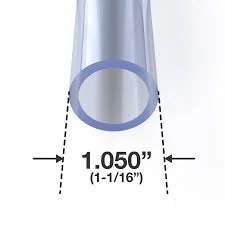Nov . 27, 2024 06:53 Back to list
HDPE Pipes for Efficient Water Supply Solutions and Applications
The Importance of HDPE Water Supply Pipes
High-Density Polyethylene (HDPE) pipes have become a popular choice in the construction and utility industries, particularly for water supply systems. These pipes are known for their durability, corrosion resistance, and flexibility, making them an ideal option for transporting water in various environments. The use of HDPE pipes offers numerous advantages that contribute to efficient and sustainable water supply management.
What is HDPE?
High-Density Polyethylene (HDPE) is a thermoplastic polymer made from petroleum. Its structure offers a high strength-to-density ratio, which gives HDPE its robust properties. This material can be produced in various grades, and when used in piping, it allows for the creation of pipes that can effectively handle high-pressure applications, making it suitable for water supply systems.
Advantages of HDPE Water Supply Pipes
1. Durability and Longevity One of the primary benefits of HDPE pipes is their long lifespan. These pipes can withstand harsh environmental conditions, such as extensive weathering, UV radiation, and corrosive substances. When installed correctly, an HDPE pipe system can last over 50 years, significantly reducing the need for frequent replacements and repairs.
2. Corrosion Resistance Unlike traditional materials like steel or iron, HDPE pipes do not corrode or rust. This quality is especially crucial in areas with aggressive soil or water chemistries. The elimination of corrosion helps maintain the quality of the water being transported, preventing any contamination.
3. Flexibility and Lightweight HDPE pipes are relatively lightweight compared to other pipe materials, which simplifies transportation and installation. Their flexibility allows for bending around obstacles, reducing the need for fittings and joints. This characteristic is particularly beneficial in regions with unpredictable terrain or in areas requiring trenchless installation methods.
4. Low Leakage Rates HDPE pipes have a fused joint system that creates a homogenous bond between pipe sections. This fusion process minimizes the risk of leaks, which is crucial for preserving water resources and ensuring efficient delivery. The leaktight nature of HDPE systems contributes to sustainable water management and reduces the loss of treated water.
5. Cost-Effective While the initial investment in HDPE pipes may be higher than traditional materials, the overall cost-effectiveness is apparent in the long term. Reduced maintenance costs, extended service life, and low leakage rates all contribute to significant savings over time. Furthermore, the installation process, being simpler and faster, can lead to reduced labor costs.
hdpe water supply pipe

6. Environmental Impact HDPE is recyclable, which adds an environmental advantage to its use. After the end of its life cycle, HDPE pipes can be reused for manufacturing new products. This recycling capability aligns with the increasing emphasis on sustainable practices in construction and urban development.
Applications of HDPE Pipes in Water Supply
The versatility of HDPE pipes allows for various applications in water supply systems. They are commonly used for
- Municipal Water Supply HDPE pipes are often seen in urban water distribution systems, where their reliability and durability are critical in delivering potable water to communities.
- Sewage and Wastewater Management The resistance to corrosion makes HDPE pipes an excellent choice for sewage and wastewater transport, preventing contamination of the water supply.
- Irrigation Systems Farmers and agricultural businesses benefit from HDPE’s flexibility and durability, ensuring that irrigation systems remain efficient and effective throughout the growing season.
- Industrial Applications Industries that require safe and reliable water transport opt for HDPE pipes to manage resources and minimize downtime due to leaks or corrosion.
Conclusion
As the global demand for efficient water supply systems continues to rise, HDPE pipes stand out as a superior choice for modern infrastructure. Their durability, corrosion resistance, flexibility, and cost-efficiency position them as the material of choice for a wide range of applications. By investing in HDPE water supply pipes, municipalities, industries, and agricultural operations can ensure that they meet current needs while promoting sustainable practices for the future. The transition to HDPE not only signifies a step forward in technology but also reflects a commitment to environmental stewardship and resource conservation.
-
High-Quality PPR Pipes and Fittings Durable ERA PPR & PVC PPR Solutions
NewsJul.08,2025
-
Black HDPE Cutting Board - Durable, Non-Porous & Food Safe HDPE Plastic Cutting Board
NewsJul.08,2025
-
High-Quality CPVC Panel Durable HDPE & PVC Panels Supplier
NewsJul.08,2025
-
Double PE Welding Rod Supplier - High Strength, Durable & Versatile Welding Solutions
NewsJul.07,2025
-
High-Quality PVC-O Pipe Supplier Durable 75mm PVC Pipe & Connections Leading PVC Pipe Company
NewsJul.07,2025
-
HDPE Drainage Pipe Supplier – Durable & Corrosion-Resistant Solutions
NewsJul.06,2025

